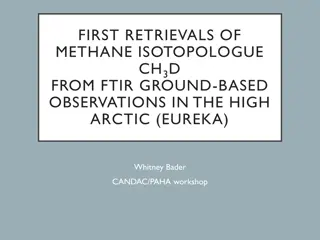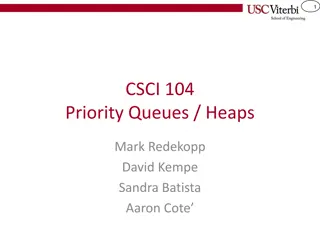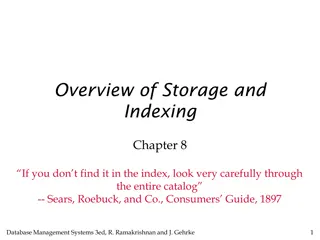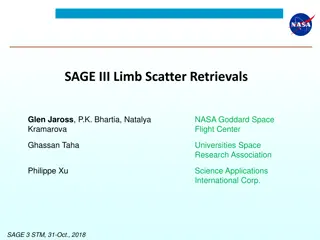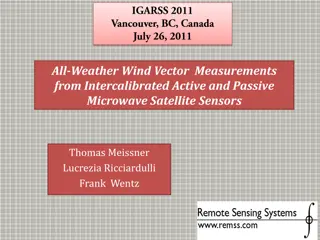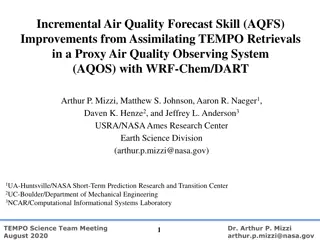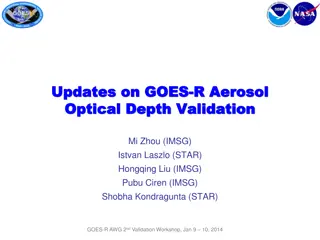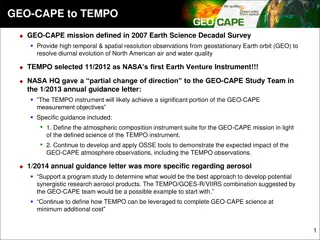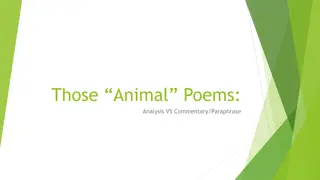First Retrievals of Methane Isotopologue CH3D in High Arctic - EUREKA Workshop
Atmospheric methane, a key anthropogenic greenhouse gas, has seen a significant increase since pre-industrial times. The study focuses on retrieving the isotopologue CH3D from ground-based FTIR observations in the high Arctic, using specialized instrumentation and datasets. The research aims to unra
0 views • 16 slides
Understanding Priority Queues and Heaps in Data Structures
Priority queues prioritize item retrieval based on value, contrasting with traditional queues that follow a first-in-first-out approach. Priority queues efficiently manage items based on their importance, often utilized in scenarios like emergency rooms or air traffic control. Heaps, a form of binar
0 views • 20 slides
Storage and Indexing Overview in Database Management Systems
The chapter on storage and indexing covers various aspects such as data retrieval from external storage disks and tapes, file organizations like heap files and sorted files, as well as the importance and structure of indexes in speeding up data retrievals. It delves into B+ Tree indexes and their or
1 views • 33 slides
Advanced Analysis of SAGE III Limb Scatter Retrievals
The proposed effort focuses on enhancing LaRC operational retrieval codes for SAGE LS data, correcting Level 1 radiances, and recommending LS operational scenarios. OMPS LS retrieval algorithms for aerosol and ozone, as well as the SAGE/M3 LS ozone retrieval approach, are detailed. Out-of-field stra
0 views • 12 slides
Database Deployment Automation for IMS Interfaces
Automate your database deployments for IMS interfaces within the scope of various systems and interfaces including Wells Fargo, SUNTAX, transport scanners, KODAK, Fujitsu, FDLE, CAMS, DBPR, and more. This includes interfaces to GTA, CAMS, Wells Fargo, Florida Department of Law Enforcement (FDLE), an
0 views • 9 slides
Insights into UV/VIS Backscattered Sun Light Retrievals from Space-Born Platforms
Explore the history, instruments, and future of UV/VIS backscatter spectrometers, including a comparison of TOMS and OMI systems, the GEO constellation, and examples of data retrievals. Dive into the discovery of the ozone hole and the advancements in atmospheric chemistry analysis by USA, Europe, a
0 views • 41 slides
Analysis of All-Weather Wind Vector Measurements from Satellite Sensors
This study compares passive (radiometer) and active (scatterometer) microwave satellite sensors in measuring all-weather wind vector speeds. Challenges such as high wind speeds and wind speeds in rain are discussed along with the crucial role of the Ocean Surface Emissivity Model in the retrieval al
0 views • 22 slides
Enhancing Air Quality Forecasting with TEMPO Retrievals in Proxy Observing System
Improvements in Air Quality Forecast Skill (AQFS) are explored by assimilating TEMPO retrievals in a Proxy Air Quality Observing System (AQOS) using WRF-Chem/DART. The study focuses on benefits identified through a designed OSSE scenario, including application to the Front Range Air Pollution and Ph
0 views • 8 slides
Updates on GOES-R Aerosol Optical Depth Validation Activities
Generated proxy data algorithm enhancements for post-launch validation activities were discussed at the GOES-R AWG 2nd Validation Workshop in January 2014. The use of MODIS reflectances as a proxy for ABI to retrieve Aerosol Optical Depth (AOD) was emphasized, along with the importance of AERONET gr
0 views • 25 slides
Evolution of GEO-CAPE: Leveraging TEMPO for Atmospheric Observations
The GEO-CAPE mission, defined in the Earth Science Decadal Survey of 2007, aims to provide high-resolution observations from geostationary Earth orbit to monitor North American air and water quality. NASA's TEMPO instrument, selected in November 2012, plays a crucial role in achieving GEO-CAPE's obj
0 views • 5 slides
Analysis and Commentary of Animal Poems
The analysis and commentary provided delve into the personalities of animals depicted in poems, focusing on the detailed characteristics and behaviors portrayed through the choice of words and literary devices. The distinction between analysis and commentary is explored through examples from poems l
0 views • 9 slides
